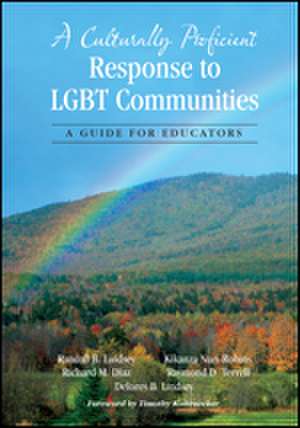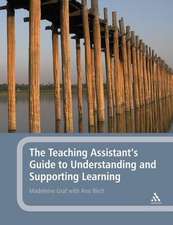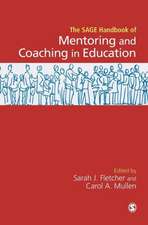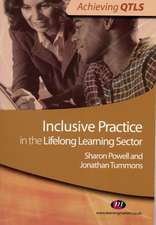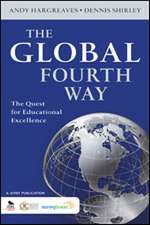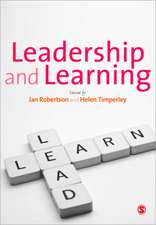A Culturally Proficient Response to LGBT Communities: A Guide for Educators
Autor Randall B. Lindsey, Richard M. Diaz, Kikanza Nuri-Robins, Raymond D. Terrell, Delores B. Lindseyen Limba Engleză Paperback – 11 aug 2013
Positive systemic change begins when school leaders elevate understanding and propel schools toward safe and diverse-friendly environments. To combat anti-gay discrimination, educators often use silence, policy, legislation and compliance. This brave book maintains that building safe and welcoming schools begins not only with effective and appropriate policy but also with inside-out analysis of one's own beliefs and values. Resulting cultural proficiencies boost empathy and improve learning environments. On this simple premise, readers will find:
- Inside-out growth through personal stories and case-studies
- Reflection through activities appropriate for individuals and teams
- Insight through current responses to bullying
Preț: 249.04 lei
Nou
Puncte Express: 374
Preț estimativ în valută:
47.65€ • 49.75$ • 39.44£
47.65€ • 49.75$ • 39.44£
Carte tipărită la comandă
Livrare economică 05-19 aprilie
Preluare comenzi: 021 569.72.76
Specificații
ISBN-13: 9781452241982
ISBN-10: 1452241988
Pagini: 184
Dimensiuni: 178 x 254 x 13 mm
Greutate: 0.4 kg
Ediția:1
Editura: SAGE Publications
Colecția Corwin
Locul publicării:Thousand Oaks, United States
ISBN-10: 1452241988
Pagini: 184
Dimensiuni: 178 x 254 x 13 mm
Greutate: 0.4 kg
Ediția:1
Editura: SAGE Publications
Colecția Corwin
Locul publicării:Thousand Oaks, United States
Recenzii
"A Culturally Proficient Response to LGBT Communities is one of the most authentic books I have ever read on how to be more inclusive and equitable to the LGBT school community. The reflection, dialogue, and going deeper sections provide educators with the opportunity to do the inside-outside work necessary to be a culturally proficient educator inclusive of LGBT colleagues, students, and parents/community members. This book contains numerous practical applications written in the context of the cultural proficiency framework, guiding principles, tools, and continuum that make it immediately applicable and user friendly for schools."
"With the goal of genuine inclusion and equity for the LGBTQ community, this is a timely and superbly written book for educational leaders striving to support personal transformation and social change in their schools and beyond."
"Culturally proficient persons are urgently needed who will take the initiative to change prejudicial beliefs and educational practices, biased interactions, discrimination, or bullying directed toward anyone in the LGBT or broader community. This text enhances the critical reflection, will, and skills needed to help make cultural democracy a reality for all."
"Cultural competence as a construct requires a commitment to address more than race, ethnicity, gender, disability and socioeconomics. LGBTQ students are often bullied or excluded, are statistically over-represented among teen suicides, and have lower graduation rates overall. Because of fear, shame, and peer pressure, they often suffer in silence. The needs of these students are often overlooked because educators are unaware, uncomfortable, or poorly informed. The culturally competent school is proactive in its awareness of the needs of these students, its willingness to intervene, and its skills in working with LGBTQ issues."
"LGBT students want to be respected and understood as individuals; not just as a member of a demographic group or other impersonal category. Our schools and districts should be a safe, healthy, secure and inclusive environment for all employees and students. We need to ensure that there is a teacher in every classroom who cares that ALL students are treated with respect."
"This book provides essential tools for educators who want to make schools safe and welcoming for all students. Utilizing the conceptual framework of Cultural Proficiency, the authors expertly discuss a case analysis and practical example of one school district delving into providing equity and inclusion for their LGBT community. Throughout the book there are discussion sections and personal reflection opportunities to engage educators in dialogue about school responses to LGBT students - including bullying, adult perceptions, engaging bystanders, and providing resources. The glossary of terms that relate to LGBT communities is also exceptionally helpful in framing conversations and creating an understanding of this important topic for educators. I could not put this book down; in my nearly 25 years of education I have not come across a resource that handles the needs of LGBT students as sensitively and supportively as these authors have using the tools of Cultural Proficiency."
"The authors of this text apply their proven expertise of the deeply relational notions of Cultural Proficiency to the needs of school children marginalized by homophobia and heterosexism. Discussions of sexual orientation and gender identity are only rarely and controversially included in educational discourse, even while students such as Zac—quoted in the book’s introduction—notes that, 'I did not feel safe in my own school, a place where I am supposed to be able to be myself and learn who I am.' In this text, the authors make it absolutely clear that school is the place for addressing issues of equity and for advancing a more generous and accepting society. Most of us have seen messages from the It Gets Better campaign, a project designed to bring attention and commitment to providing hope for lesbian, gay, transgender, bisexual and other bullied human beings. In this inspiring text the authors show how it gets better. And just as importantly, they explain why it must get better—because, according to Zac, the bigotry and intolerance 'hurt me and it hurts everyone.'"
"With the goal of genuine inclusion and equity for the LGBTQ community, this is a timely and superbly written book for educational leaders striving to support personal transformation and social change in their schools and beyond."
"Culturally proficient persons are urgently needed who will take the initiative to change prejudicial beliefs and educational practices, biased interactions, discrimination, or bullying directed toward anyone in the LGBT or broader community. This text enhances the critical reflection, will, and skills needed to help make cultural democracy a reality for all."
"Cultural competence as a construct requires a commitment to address more than race, ethnicity, gender, disability and socioeconomics. LGBTQ students are often bullied or excluded, are statistically over-represented among teen suicides, and have lower graduation rates overall. Because of fear, shame, and peer pressure, they often suffer in silence. The needs of these students are often overlooked because educators are unaware, uncomfortable, or poorly informed. The culturally competent school is proactive in its awareness of the needs of these students, its willingness to intervene, and its skills in working with LGBTQ issues."
"LGBT students want to be respected and understood as individuals; not just as a member of a demographic group or other impersonal category. Our schools and districts should be a safe, healthy, secure and inclusive environment for all employees and students. We need to ensure that there is a teacher in every classroom who cares that ALL students are treated with respect."
"This book provides essential tools for educators who want to make schools safe and welcoming for all students. Utilizing the conceptual framework of Cultural Proficiency, the authors expertly discuss a case analysis and practical example of one school district delving into providing equity and inclusion for their LGBT community. Throughout the book there are discussion sections and personal reflection opportunities to engage educators in dialogue about school responses to LGBT students - including bullying, adult perceptions, engaging bystanders, and providing resources. The glossary of terms that relate to LGBT communities is also exceptionally helpful in framing conversations and creating an understanding of this important topic for educators. I could not put this book down; in my nearly 25 years of education I have not come across a resource that handles the needs of LGBT students as sensitively and supportively as these authors have using the tools of Cultural Proficiency."
"The authors of this text apply their proven expertise of the deeply relational notions of Cultural Proficiency to the needs of school children marginalized by homophobia and heterosexism. Discussions of sexual orientation and gender identity are only rarely and controversially included in educational discourse, even while students such as Zac—quoted in the book’s introduction—notes that, 'I did not feel safe in my own school, a place where I am supposed to be able to be myself and learn who I am.' In this text, the authors make it absolutely clear that school is the place for addressing issues of equity and for advancing a more generous and accepting society. Most of us have seen messages from the It Gets Better campaign, a project designed to bring attention and commitment to providing hope for lesbian, gay, transgender, bisexual and other bullied human beings. In this inspiring text the authors show how it gets better. And just as importantly, they explain why it must get better—because, according to Zac, the bigotry and intolerance 'hurt me and it hurts everyone.'"
Cuprins
Foreword by Timothy Kaltenecker
Acknowledgments
About the Authors
Introduction
I. Introduction--Background, Challenges, and Opportunity
1. Setting the Context
Getting Centered
Going Deeper
2. The Tools of Cultural Proficiency
Getting Centered
Going Deeper
3. Equality and Equity Are Both Important, Just Not the Same
Getting Centered
Going Deeper
4. Understanding Our History Helps Shape Our Future
Getting Centered
Going Deeper
II. Westfield Unified School District
5. Creating Safe Space: Moving From Compliance to Advocacy
6. Assessing Cultural Knowledge
Getting Centered
Valuing Diversity
Westfield Unified School District Case Story
Going Deeper
7. Valuing Diversity
Getting Centered
Valuing Diversity
Westfield Unified School District Case Story
Going Deeper
8. Managing the Dynamics of Difference
Getting Centered
Managing the Dynamics of Difference
Westfield Unified School District Case Story
Going Deeper
9. Adapting to Diversity
Getting Centered
Adapting to Diversity
Westfield Unified School District Case Story
Going Deeper
10. Institutionalizing Cultural Knowledge--You, Your School, and Your Community
Getting Centered
Institutionalizing Cultural Knowledge
Professional Learning for General Educators
Going Deeper
III. Next Steps
11. Moving From Bystander to Ally
Why We Do This Work
Resources
Resource A1 – Book Study Guide
Resource A2 – The Apps of Cultural Proficiency
Resource B – Quick Glossary
Resource C1 – Sexual Orientation Questionnaire
Resource C2 – Unpacking the Knapsack of Sexual Orientation Privilege
Resource D – Community Resources
Resource E - Cultural Proficiency Books’ Essential Questions
Cultural Proficiency Books Matrix
References
Index
Acknowledgments
About the Authors
Introduction
I. Introduction--Background, Challenges, and Opportunity
1. Setting the Context
Getting Centered
Going Deeper
2. The Tools of Cultural Proficiency
Getting Centered
Going Deeper
3. Equality and Equity Are Both Important, Just Not the Same
Getting Centered
Going Deeper
4. Understanding Our History Helps Shape Our Future
Getting Centered
Going Deeper
II. Westfield Unified School District
5. Creating Safe Space: Moving From Compliance to Advocacy
6. Assessing Cultural Knowledge
Getting Centered
Valuing Diversity
Westfield Unified School District Case Story
Going Deeper
7. Valuing Diversity
Getting Centered
Valuing Diversity
Westfield Unified School District Case Story
Going Deeper
8. Managing the Dynamics of Difference
Getting Centered
Managing the Dynamics of Difference
Westfield Unified School District Case Story
Going Deeper
9. Adapting to Diversity
Getting Centered
Adapting to Diversity
Westfield Unified School District Case Story
Going Deeper
10. Institutionalizing Cultural Knowledge--You, Your School, and Your Community
Getting Centered
Institutionalizing Cultural Knowledge
Professional Learning for General Educators
Going Deeper
III. Next Steps
11. Moving From Bystander to Ally
Why We Do This Work
Resources
Resource A1 – Book Study Guide
Resource A2 – The Apps of Cultural Proficiency
Resource B – Quick Glossary
Resource C1 – Sexual Orientation Questionnaire
Resource C2 – Unpacking the Knapsack of Sexual Orientation Privilege
Resource D – Community Resources
Resource E - Cultural Proficiency Books’ Essential Questions
Cultural Proficiency Books Matrix
References
Index
Notă biografică
Descriere
Positive systemic change begins when leaders propel schools toward diverse-friendly environments. Build welcoming, safe spaces through this inside-out analysis of cultural proficiencies, policies, and practices.
